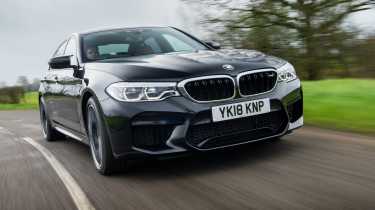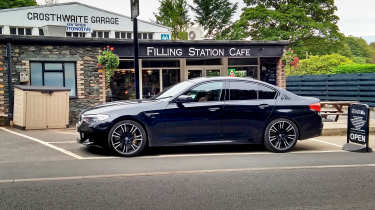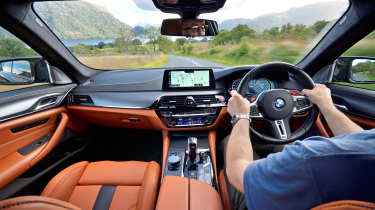BMW M5 (F90) Fast Fleet test – 9 months with the 592bhp four-door
It may have been faster, more powerful and more complex that any M5 before, but the 592bhp F90 also managed to channel the spirit of some of its more distant forebears. We recount our 9 month stint with the super saloon
'The M5 or the Alfa Giulia?’ If I had a pound for every time I was asked that question during my nine months of running evo’s M5 it would possibly stretch to paying for a tank of superunleaded in its belly.
The answer? For pure thrills the Giulia Quadrifoglio was – is – ahead of the M5. Ahead of pretty much any supersaloon you care to mention. It’s such a singly focused device, one that doesn’t pretend to offer anything but the purest, richest and highest-octane thrills this side of a supercar. Which led many to believe that having the BMW replace the Alfa as my long-termer must have been a crushing disappointment. Far from it.
> New BMW M5 Touring to enter production in 2024 – hot estate US bound
From the off the M5 lets you know exactly what it’s all about. It has no pretence of being a highly strung track thug or a lap-time-chasing addict. Rather it is the closest reinterpretation of the original M5 recipe that I think I have experienced since the first V8-engined version, the E39 from 1999.
Before the F90 arrived there had been a sense that BMW M was chasing Mercedes-AMG so hard in the performance stakes that it had lost sight of what made the M5 so unique and iconic in the first place. But the F90 feels more mature than other recent M5s, less pent up with aggression and as if it’s trying to prove something, and it’s all the better for it. Despite the power increase, the torque hike and performance gains, this M5 proved itself to be a better, more rounded car, offering greater duality than previously seen from M and other modern supersaloons.
So while it lacked the nailed-down 100-per-cent-focus approach of an E63 S, the M5 perfectly melded comfort when you needed it with the performance you expected. Much of this was down to its balanced driver modes. Knock it all back to Comfort and it felt like a 540i that had completed a few more reps in the gym, but switch to Sport and the M5’s true character appeared. It’s the setting it felt at its most natural in and which got the best from the car. Given the opportunity to ask an M5 engineer what their optimal setting is, I suspect they’d say this.
More reviews
Why so? In Sport the engine is mapped to respond as you’d expect an M-badged 4.4-litre twin-turbo V8 to. It wasn’t snappy, and unlike many of its ilk it wasn’t all about torque, either. You could reach into its power curve and meter out the performance exactly as required, enabling you to trim entry and exit speeds with far more precision than either an M3 or 4 has allowed since they adopted a pair of blowers. It was like stepping back in time, remembering how great both the E39 and the E34 before it were – and how dominant the M5 once was, too.
And all this despite the F90 being the first four-wheel-drive M5. The reality is the adaptive system is so intuitive and quick to react that the car never really felt four-wheel drive. Like AMG’s 4Matic system it steps in when it needs to rather than nannying you at every opportunity. One of my ploys to hang on to KNP for longer was a suggestion that I should run it through the winter months to really try out the all-wheel-drive capabilities. I’ve never heard the BMW press office use language like that before…
As you would hope with a car that arrived commanding a six-figure price tag, the M5 was a paragon of reliability. Well, almost. Other long-term-test M5s had thrown up a few issues – namely a fuel-pump failure and a dodgy front diff – but evo’s only required a trip to the workshop to rectify a roof rail that had worked itself loose.
An issue I did have was with the Pirelli P Zero tyres the car came fitted with. BMW homologated two tyres for the M5: the Pirelli and Michelin’s Pilot Sport 4 S, with the former fitted to the press cars because they are deemed by the engineers to be the quicker tyre. That as may be, but in the wet they struggled from new and when the wear dropped below 3mm the M5’s chassis became a bit wayward and unpredictable just when you didn’t want it to be. A switch to the Michelins eradicated this as well as adding a touch of sharpness to the chassis overall, allowing you to push it harder than previously. If it was me I’d sacrifice some speed for the increased feedback the French rubber offered.
Now, of course, there is an M5 Competition, a car that polishes the performance further: a little sharper, more responsive and agile. All marginal-gains stuff, but still noticeable. So where does this leave the regular car? As one of best all-round supersaloons – if not the very best – on the market. AMG’s still rule if you want a wagon, but the M5 is back to its best.
| Date acquired | March 2018 |
| Duration of test | 9 months |
| Total mileage | 14,231 |
| Overall mpg | 24.6 |
| Total costs | £1115 (four tyres) |
| Purchase price | £103,210 |
| Value today | c£45,000 (2024) |
This story was first featured in evo issue 257.





